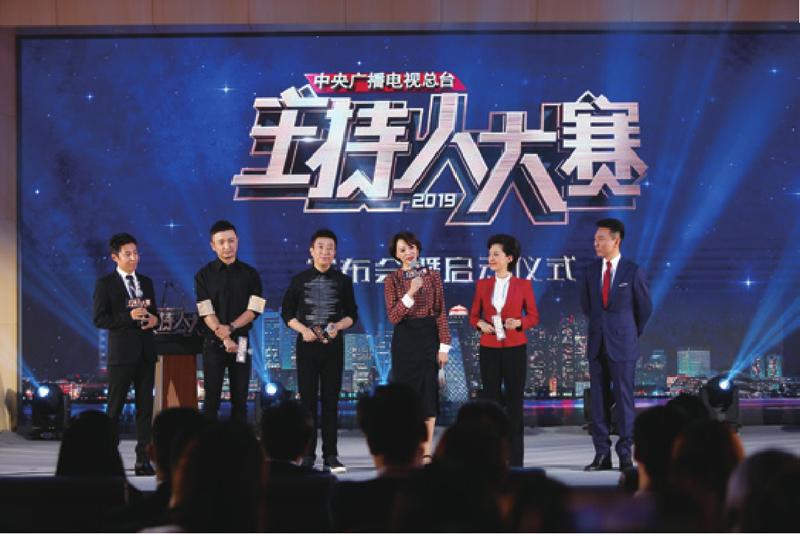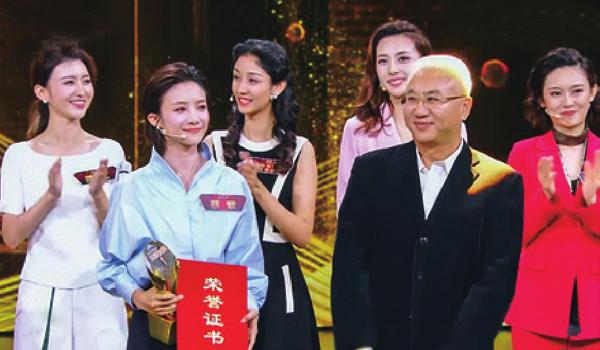Finding Their Anchors
By Ma Miaomiao

When Li Qiyue, a TV anchor, participated in a competition for anchors in 2011, she invited postman Cao Zhengfu to the studio for a fi ve-minute interview as part of the competition event. The interview bombed badly. Though Li asked Cao several questions to make him tell his story to the audience, he was an introvert and said little. The interview ended on an embarrassing note as both of them were fl ustered.
Last year, Li learned that the China Media Group (CMG), an umbrella of broadcasters, would be holding its seventh national anchor competition in October. She signed up and during the competition, chose Cao again as her interviewee. However, this time instead of asking him questions in the studio, she followed him on his daily route to show her audience what his life is like.
Caos beat is the longest postal route in Yuxian, a county in Hebei Province, north China, where the steep mountain ways and the isolation of the scattered villages are a block to communication. The 57-year-old delivers newspapers and mails to 27 villages along the rugged mountain roads twice a week on foot. He is the link between villages not yet connected to the transportation grid and the outside world. As many young people from the villages have gone outside for work, Cao is also the bridge between them and their parents through delivering packages and handing over articles of daily use.
While telling Caos story in the studio, Li said it was the story of an ordinary hero who has been doing his job with perseverance. The video made up for her regret over the botched interview eight years ago. She has now learned how to be a real anchor.
The competition, started in 1998, aims to provide a national competition platform for TV anchors and select outstanding ones for future programs.
Lis story shows her personal growth. It also shows how an old variety show has been remodeled. Instead of being confi ned to the studio wearing chic clothes, anchors are now encouraged to do on-site interviews and tell the stories they experience.
Good storytelling
The results of the competition are evaluated by a panel of judges from universities and other professions as well as the viewers. Many viewers said on Weibo, a popular Chinese social media platform, that they were touched by the stories of ordinary people told by the anchors.
“As a media practitioner, this program made me understand better how to tell stories,” Li Jin, a 25 year-old journalist based in Nanjing, told Beijing Review.
“This competition aims to assess the ability of the anchors to tell a good story,”Jing Yidan, Director of China Television Broadcaster Association, told China Youth Daily.
In Shenzhen, Guangdong Province in south China, a car wash company employs people with autism, Down syndrome and cerebral palsy. Tian Jinghua, a contestant, went to the car wash and washed 53 cars with them. While telling the story of the washers, he said theyve got what they want, earn money for their own livelihood and be embraced by society.

Nineteen more car washes in 16 cities around China have now adopted this model to offer more opportunities to people with developmental disabilities, Tian said while concluding his story.
Another contestant, Feng Shuo, spent seven hours on corkscrew mountain roads, climbing two mountains over 5,000 meters above sea level to visit the border guards in Tibet Autonomous Region in southwest China. He followed them on their patrols, experiencing the harsh natural environment and hard life. Fourteen guards lost their lives on these paths in the past 30 years, but no one has chosen to quit. One of the guards has been working there for 18 years. Their persistence is the epitome of the sense of mission and responsibility of every Chinese soldier, Feng said.
He also said the field visit enabled him to reflect more on his profession. He now understands that anchors should not limit themselves to reading news in the studio, but do more spot coverage and tell stories that are touching and inspiring.
Wider talent pool
“I saw a lot of new faces in this years competition,” Chen Yongqing, Deputy Director of China Central Television (CCTV) Financial Channel, said. “Moreover, with their edu- cational background and strong abilities to analyze and comprehend things, they have shown great potential.”
Of the 60 contestants in the fi rst round of the competition, 40 percent had a doctorate or masters degree. And their professional backgrounds were more diversified. There were majors in geography, foreign languages and literature, computer science and public policy. About 56 percent of the anchors were in their 20s or 30s.
“Diverse backgrounds and overseas study experiences are needed to enrich the image of the group and meet the changing requirements of TV programs,” Jing said.
Gong Fan, one of the contestants, spoke about using artificial intelligence in writing poetry in her three-minute presentation. A postgraduate in computer science from the University of Pennsylvania in Philadelphia, the U.S., she said her academic background helped her to explain the technology. Yu Hong, Deputy Dean of the School of Journalism and Communication at Peking University, said the changing world calls for more young people from various disciplines with different personalities to get involved in the industry.
The 2020 Spring Festival gala show of CCTV, aired on January 24, had five hosts. And two of them were from the contest, which meant a big break for them.

